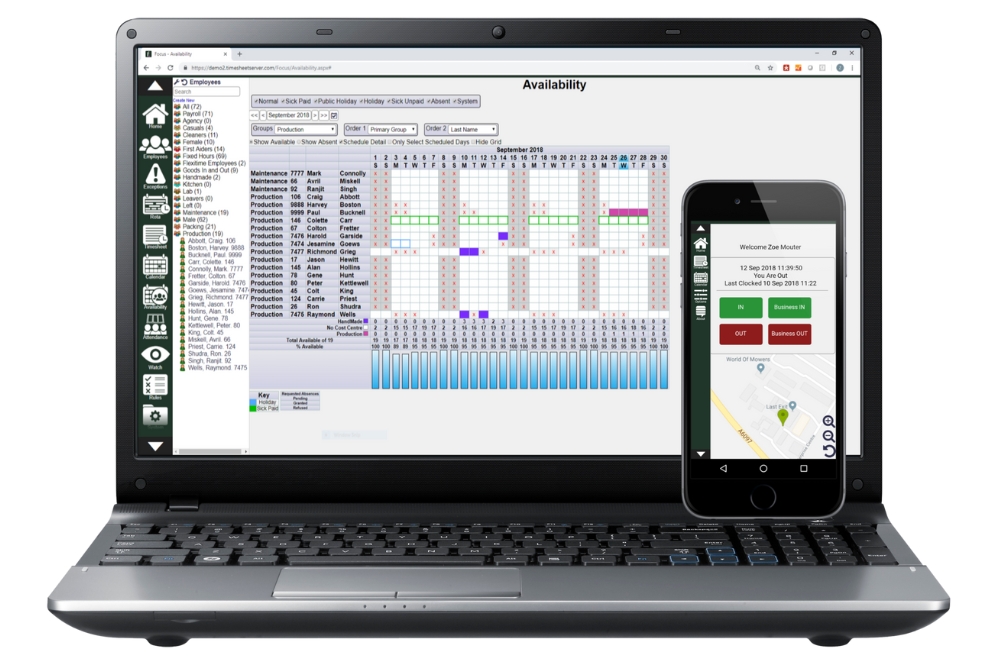
Embracing Adaptability: How to Develop a Flexible Working Culture
Companies across the UK are recognising the importance of having a flexible working culture. In an era where technology continuously evolves, embracing a flexible work-life balance has become essential to attract and retain highly skilled and talented employees.
This article explores critical insights and actionable steps to cultivate a flexible working culture within a company, from applying flexible work schedules to implementing policies towards an adaptable work environment.

What is Flexible Working?
Flexible working refers to a work arrangement allowing employees to depart from the traditional 9-to-5 office-based routine and embrace an adjustable work-life balance.
Employees will have greater control over their hours, schedule and where they work, enabling them to balance their personal and professional commitments better. As a result, this will enhance their productivity, job satisfaction, well-being and personal relationships.
Provide Training and Support
An important aspect of change management within any company is training and support. When big changes occur, such as changing the work culture, training and support will enable all employees to familiarise themselves with the company’s platforms and tools needed for remote work that will form the basis of timekeeping, communications and project management.
Further training programs and support will be provided in an office or online to ensure all employees have the skills and knowledge to complete specific tasks independently. Some employees will need more help when transitioning to a flexible working culture. This will result in regular check-ins and other peer support networks.
Create a Clear Policy
A clear policy should highlight the company’s stance on flexible working arrangements, including eligibility, security responsibility, requirements, accountability and communication expectations.
This will provide employees with clear and set guidelines to know what is expected of them when working remotely and how the company will monitor their scheduled hours.
It’s also vital to address company confidentiality, making sure employees’ home Wi-Fi connection is secure.
Encourage Work-Life Balance
Flexible working culture enables employees to adjust their working hours to accommodate personal commitments, such as attending their children’s school events, caregiving, studying or pursuing personal interests.
This enables employers to manage their time better, improve productivity, enhance job satisfaction and reduce stress and burnout.
Provide Remote Work Opportunities
Remote work allows employees to perform their tasks and responsibilities outside the traditional office, promoting autonomy. Not only does this encourage employees to be more self-motivated, but it eliminates commuting time and expenses.
In addition, allowing employees to work remotely can lower office overhead costs such as rent and utilities.
Embrace Technology
Technology is a vital tool in supporting remote working arrangements. For instance, a cloud-based platform provides easy access to shared files and documents. This allows employees to collaborate in real-time on any device from anywhere with internet access.
In addition, project management software helps employees stay connected and work as a team by coordinating tasks and tracking each other’s progress.
Ultimately, embracing technology can maintain productivity regardless of physical distance.
Asset Tracking
An asset tracking system should be implemented for employees working away from the office. This ensures that all electrical devices employees need to perform their tasks are accounted for.
Keeping a record of the valuable assets’ movement can prevent loss or theft, saving costs associated with replacement. In addition, it also promotes smooth operation, reducing downtime within a flexible working culture.
Booking System
Facilitating a booking system allows employees to reserve and book specific spaces based on their needs. For instance, a conference room may be required for a private meeting, or a hot desk may be needed at a particular time to meet for collaborative sessions.
An online booking system ensures all employees can view and book available slots. This promotes fair usage and effective planning to avoid conflict and disappointment.
Implement a Time and Attendance Systems
Regardless of location, employees can use the time and attendance system to clock in their start and finish times and accurately track their working hours.

A time and attendance system can also ensure that management distributes overtime fairly and that appropriate coverage is planned to create a healthier work-life balance for all employees.
Further to this, the benefits of such a system include recording all attendance and non-attendance, reporting, managing holidays and self-booking to support employee ownership. Integrated security access can also be utilised. This will enhance the capability of the business to offer flexible working and resource the organisation with staff. Significant adverse resourcing issues such as absenteeism and presenteeism can be monitored and tackled early.
Offer Flexible Schedule
Allowing employees to work a flexible schedule can help them work around personal obligations such as doctor appointments, family responsibilities or personal engagements without asking for additional time off, promoting a supportive and positive work environment.
This flexibility allows employees to maintain a healthy work-life balance without compromising on professional responsibilities and commitments, ultimately increasing stability and job satisfaction.
Focus on Outcomes
By transitioning from a traditional 9-to-5 schedule to a flexible one, employees can work in blocks that encourage them to focus on outcomes rather than time spent at work.
This can help employees deliver high quality, meet deadlines and achieve monthly goals. In addition, an outcome focus approach can give employees a sense of purpose and accountability, leading to high levels of productivity and innovation.
Offer Breaks and Social Time
Breaks provide an opportunity for employees to recharge, destress and refocus. This prevents burnout and long-term sickness. Companies can demonstrate their commitment to promoting a healthy work environment by offering a dedicated area for relaxation and nourishment.
Additionally, companies can encourage social time by designating a comfortable area in the office to help employees build relationships, collaborate and share innovative ideas. Working as a team can lead to a more supportive environment, reducing employee turnover.
Flexible and Adaptable Furniture
Incorporating flexible and adaptable furniture within the office can accommodate work styles to suit various tasks.
For instance, adjustable dividers to create quiet and focus areas, rolling desks and portable storage units to encourage employees to work from different locations significantly enhances employees’ ability to focus.
Also, investing in ergonomic furniture such as adjustable chairs, standing desks and monitor arms brings significant advantages, for they have been proven to improve employee posture, enhancing their comfort and well-being. Consequently, it also reduces absenteeism due to work-related health issues.
Increase Sustainability
Implementing hot-desking and promoting working from home can significantly contribute to the environment. It reduces the carbon emissions that commuting back and forth to work creates and the overall environmental impact associated with operating and maintaining a large office space.
By embracing modern technology, companies can decrease paper consumption and the need for disposable pens to present a more sustainable work environment.
Strengthen Reputation
A flexible work culture can strengthen a company’s reputation by demonstrating that the company is forward-thinking and can adapt and embrace a modern work practice that caters to the employees’ evolving needs.
Companies that prioritise employees’ well-being by promoting a healthy work-life balance create a culture of job satisfaction, which can ultimately attract new clients and employees. In addition, when employees are supported, they are likely to be more focused, engaged and motivated to deliver high-quality work, leading to customer satisfaction and the company’s overall reputation.

Zoë Mouter is the joint owner and director of Egress Systems, a leading provider of time and attendance solutions. With two decades of experience in the workforce management sector, Zoë collaborates with HR, payroll, and IT experts to deliver tailored solutions across a diverse range of industries, including logistics, manufacturing, retail, hospitality, education, charities, waste management, and healthcare.
Before founding Egress Systems, Zoë honed her skills over 10 years as an IT professional at global data and technology companies Experian and Egg. During this time, she worked with multinational clients such as MBNA, Morgan Stanley, and Argos, specialising in the credit card processing sector.
Zoë holds a first-class degree in English Language and Literature from Liverpool University, alongside a Masters in Viking Studies and a TEFLA certification (Teaching English as a Foreign Language to Adults). While her focus has shifted from Viking history to Nordic walking, she enjoys expressing her creativity through ceramics, often crafting unique tea and coffee pots on her pottery wheel.
